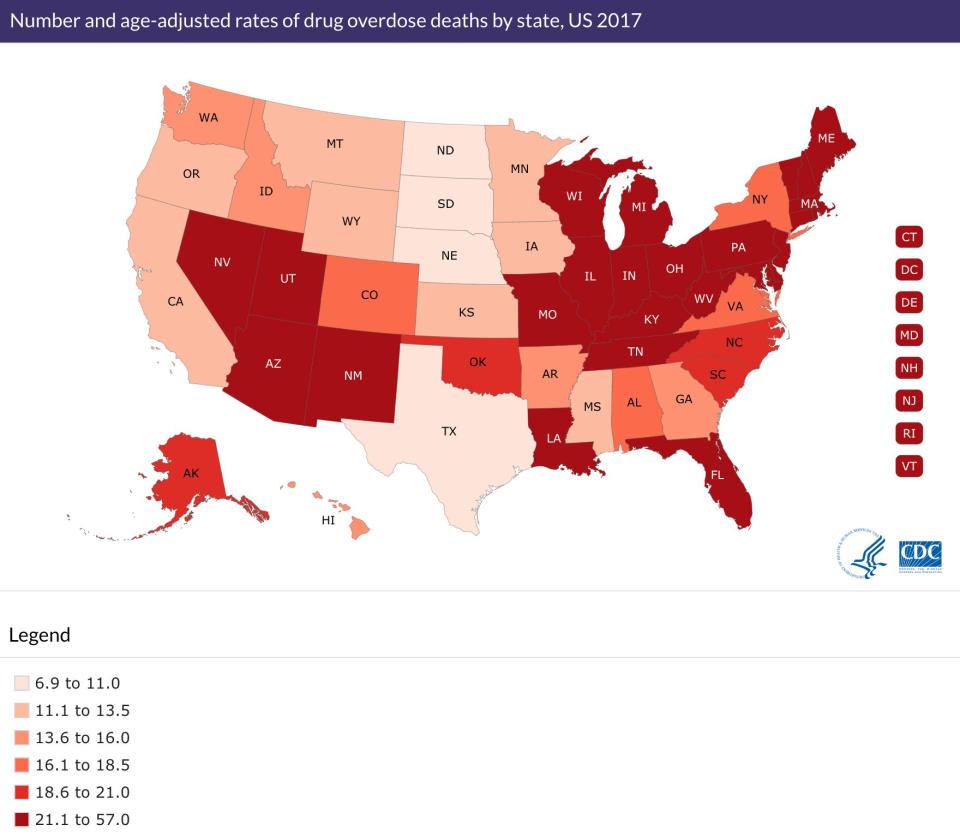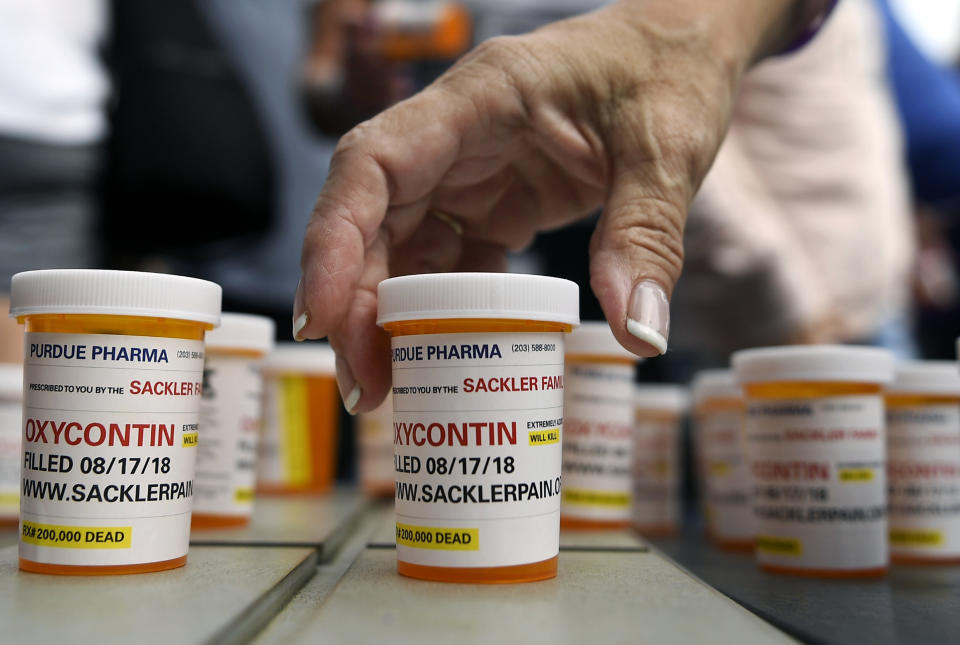Experts on Warren's $100 billion opioid plan: 'There's a tremendous amount to like'
Democratic presidential candidate Sen. Elizabeth Warren (D-Mass.) has become known for her lengthy policy proposals ahead of the 2020 election. Her latest one is a detailed plan to tackle the nation’s opioid addiction problem.
In a recent Medium post, Team Warren described the plan as “a comprehensive plan to end the opioid crisis by providing these resources needed to begin treating this epidemic like the public health crisis that it is.”
Warren is partnering with Rep. Elijah Cummings for the CARE Act, which would give $100 billion in federal funding over the next decade to states and communities that have been hit the hardest by opioid addiction because, she stated, “that’s what’s needed to make sure every single person gets the treatment they need.”
‘There’s a tremendous amount to like’
Drug policy experts who spoke with Yahoo Finance praised Warren’s opioid plan.
“There’s a tremendous amount to like here,” said Bradley Stein, director of RAND’s Opioid Policy Center. “The magnitude of the investment really matches the needs of the crisis. A lot of the investment prior to this everyone has recognized as being insufficient or a drop in the bucket. For a crisis of this magnitude, it’s going to take that type of investment.”

States, territories, and tribal governments would receive $4 billion. Another $2.7 billion would go towards the hardest hit counties and cities, with over half of it towards those with the highest overdose levels. Health professionals would get $1.7 billion for public health surveillance, research, and improved training. About $1.1 billion would go towards public and nonprofit entities “on the front lines,” while another $500 million would be given to expanding naloxone access and providing it to first responders, public health departments, and the public.
Warren’s plan would pay raise funds from a proposed ultra-millionaire tax on the richest 75,000 American families.
Stein described the proposal as “so many orders of magnitude greater than any of the investments we’ve seen to date” because they “occur over a much longer period, which I think in many ways — if you think about needing to build the infrastructure — we really need to have with respect to treatment and some of the harm reduction activities.”
‘This crisis has been driven by greed, pure and simple’
Dr. Ryan Marino, emergency medicine physician and medical toxicologist at the University of Pittsburgh School of Medicine, highlighted the proposal’s emphasis on social determents like housing and access to medical care and education.
“It’s really encouraging to see someone of her statue on the national stage in our federal government promoting life-saving methods that haven’t been promoted to this point,” Marino told Yahoo Finance, highlighting “her big emphasis on recovery and medicines for treating addiction, which haven’t been as well emphasized at the federal level.”

West Virginia, one of the states hit hardest by opioid addiction, would receive approximately $25.1 million per year in funding through the CARE Act, according to details of the plan shared with Yahoo Finance. Overall, the amount of money for each state would vary depending on the number of opioid overdose deaths.
Is this money enough to alleviate the ongoing crisis?
“It’s hard to answer that question,” Marino said. “Probably this isn’t enough. This is a really big problem. I don’t know that there’s enough money, or even one sum, that can say what’s worth the amount of human lives.”
‘This crisis has been driven by greed‘
In her post, Team Warren singled out OxyContin-maker Purdue Pharma — founded and owned by the Sackler family — for its key role in the rise of opioid addiction.
“This crisis has been driven by greed, pure and simple,” the plan stated. “If you don’t believe that, just look at the Sackler family. They own Purdue Pharma, a privately-held pharmaceutical company. Started by three brothers in the 1950s, the Sacklers grew their company into an empire — and got very rich along the way.”
While Marino agreed that greed is a factor, he made it clear that the blame for the number of opioid overdose deaths cannot solely be placed on the Sackler family and Oxycodone.
“There’s also been a lot of other problems,” he said. “Specifically, the government has criminalized opioid use and addressed the supply side, but hasn’t addressed the demand side at all.”

The Sackler family is being taken to both criminal and civil courts across the country for their role in opioid addiction, with more than 1,600 suits filed against Purdue Pharma. The company recently reached a $270 million settlement with the state of Oklahoma over aggressive marketing of OxyContin.
Purdue Pharma is reportedly considering bankruptcy to offset the legal costs from all of the suits.
“For Purdue Pharma, we know they did bad things and should be held accountable,” Marino said. At the same time, “focusing on just pharmaceutical companies and criminalizing people [isn’t] going to solve the crisis. I’m not saying they should get a free pass, but there are other issues that we need to focus on, too.”
‘A big deficiency in this proposal’
The primary issue with Warren’s plan, according to experts, involves the number of restrictions on medications for opioid treatment.
The same criticism arose after President Trump signed opioid legislation in October 2018. At the time, RAND’s Drug Policy Research Center co-Director Dr. Rosalie Pacula noted that the bill didn’t eliminate the requirement for physicians to obtain a waiver needed to prescribe buprenorphine, a medication that is crucial for treating opioid addiction.

The reason why she found that to be “really crazy” is because physicians don’t need a special waiver to prescribe addiction-causing opioids to begin with.
“If the issue is fear of getting addicted, we should have a waiver on every opioid prescribed — but we don’t,” Pacula said. “Why make it harder for them to do treatment than for the drug that causes the problem in the first place?”
Marino, the emergency medicine physician, argued that the current restrictions on methadone and buprenorphine medications — two of the best addiction-treating medicines — is “the biggest single issue that could be addressed by our federal government and create the most amount of change with one action.”
He explained: “There’s still significant restrictions where the people I work with, who are physicians or other practitioners, can’t prescribe medications for addiction even if they know it’s safe and know how to do it. Whereas, they could prescribe as much Oxycodone as they want, essentially, with no restrictions.”
Marino added that a situation in which “medicine like buprenorphine that are much safer than Oxycodone are unavailable … it’s a big deficiency in this proposal.”
‘Something you see in this legislation’
For the most part, though, Marino said Team Warren’s opioid proposal is “definitely a significant step in the right direction. I don’t think it’s necessarily the perfect solution, but it makes me very happy as someone who sees these patients [with] these problems and has been hoping to get some of these solutions for quite a while.”

Stein, director of RAND’s Opioid Policy Center, agreed.
“This crisis has evolved — it will continue to evolve,” he said. “It is evolving as we speak. The nature of the problems that we faced a decade ago, or even five years ago, have changed over the last several years.
“So, I think this needs to both make sure we’re addressing the problem now — putting in place the resources, infrastructure, and training to allow us to be able to effectively respond as this crisis is critically important. That’s something you see in this legislation.”
Adriana is an associate editor for Yahoo Finance. Follow her on Twitter @adrianambells.
READ MORE:
Experts: Gillibrand’s opioid legislation is not 'the right way to do it'
'Just a piece': The U.S. opioid epidemic is costing a fortune in lost tax revenue
Pharma CEO: 'This opioid crisis has become a fentanyl crisis'
A 'really important piece of evidence' shows how opioids keep Americans out of the workforce
Follow Yahoo Finance on Twitter, Facebook, Instagram, Flipboard, SmartNews, LinkedIn,YouTube, and reddit.
